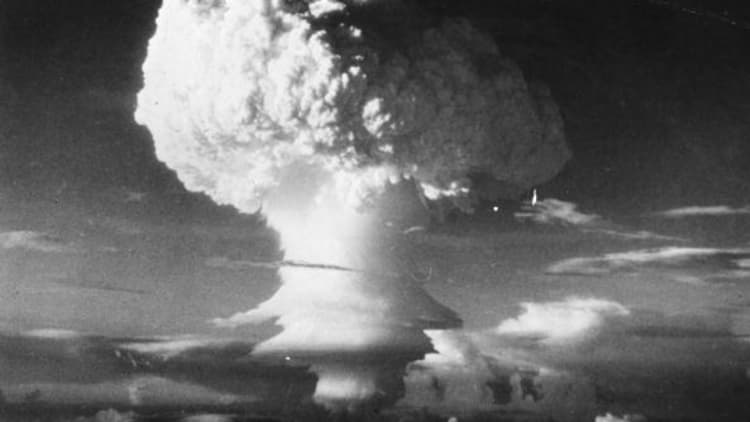President Donald Trump's recent "fire and fury" and other forceful warnings to North Korea brought him a lot of criticism at the time, but they may have been "useful" to pull things back from the brink of a military confrontation, experts said.
"I think the rhetoric from the president does register in Pyongyang, and it has been noted in Beijing," Rand senior political scientist Andrew Scobell said Wednesday in a conference call with reporters. "It doesn't seem so inappropriate."
Last Tuesday, North Korea threatened a strike on the U.S. Pacific territory of Guam with four of its Hwasong-12 intermediate-range ballistic missiles. The North's threat came only hours after Trump told reporters: "North Korea best not make any more threats against the U.S. They will be met with fire and fury like the world has never seen."
At the same time, Trump kept the pressure on North Korea last week, telling reporters Thursday that his earlier "fire and fury" comment maybe didn't go far enough. And he even followed it up Friday with a tweet about the military being "locked and loaded."
Senate Armed Services Chairman John McCain, an Arizona Republican, as well as Democratic Sen. Dianne Feinstein of California were among those critical of Trump's "fire and fury" comment last Tuesday. Also, Maryland's Democratic Sen. Ben Cardin last week in a statement compared Trump's comments to "the same kind of blustery and provocative statements as North Korea about nuclear war."
However, Kim Jong Un, the young leader of North Korea, may see the Trump warnings of military action as very credible. In April, Trump approved the 59-missile strike on a Syrian-government airfield and used the most powerful non-nuclear bomb in the American arsenal in Afghanistan. Also, a Syrian jet was downed by a U.S. warplane in June.
On Tuesday, Pyongyang backed off the Guam missile-attack threat. The regime's official news agency reported that its 33-year-old leader wanted to monitor the "reckless Yankees" but it left the door open for a strike later.
Trump turned to Twitter Wednesday to praise Kim for retreating on his Guam missile threat.
Scobell said the current situation is unprecedented and that kind of rhetoric from Trump underscores that and sends a signal to North Korea and China "that the U.S. takes the current situation extremely seriously. To that extent it's very useful."
"[In] Leninist-style dictatorships like North Korea and China, rhetoric is very important. Words matter and are carefully chosen. And words uttered by the president of the United States are closely scrutinized in both countries," Scobell explained.
Yet others say credit should be given to Defense Secretary James Mattis, a retired Marine Corps general and veteran of several wars. On Monday, Mattis responded to North Korea's threats to target Guam: "If they do that, then it's game on."
Guam is home to U.S. military bases, including an estimated 6,000 troops, and it hosts the Air Force's B-1B strategic bombers, a Navy submarine base and the Terminal High Altitude Area Defense missile interceptors.
"From my perspective, the difference in terms of what happened here wasn't what the president said, but it's what Jim Mattis said: If you launch a missile our way, 'game on,'" said Edward Turzanski, an international policy and national security expert at the Foreign Policy Research Institute, a think tank in Philadelphia.
"Jim Mattis is not someone given to intemperate speech," Turzanski added. "He's a very cautious man. He's been in the military for decades. He has ordered the use of force. He knows what it looks like. So it's not bluster, with all due respect to the president."
According to Turzanski, the president would be better served to let his top military advisors do the talking on North Korea to avoid making misstatements that the White House may regret later.
"I know that temperamentally the president feels the need to be the one who's going to call the other side out," said Turzanski. "But the danger there is you may wind up misspeaking, creating an impression where you've drawn a line. And there could be a miscalculation, which is one of the greatest drivers of warfare."
Regardless, Pyongyang did back off its Guam missile threat after the forceful comments from the Trump administration (and perhaps pressure from long-time ally Beijing). That is seen as a welcome development by foreign policy experts since the U.S. previously was not always seen as following through on its red line threats to North Korea.
"The U.S. has lost a great deal of credibility with Pyongyang and needs to reestablish it," said Bruce Bennett, a Rand senior international defense researcher specializing in northeast Asian military issues. "The rhetoric by the U.S. White House has been in part helping that credibility and intent to take action."
WATCH: If President Trump were to order a nuclear strike, here's what would happen



